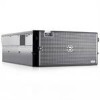Dell PowerEdge 2900 Hardware Owner's Manual (PDF) - Page 30
PCIe Degraded Link Width, Actual Link Width is - bios
 |
View all Dell PowerEdge 2900 manuals
Add to My Manuals
Save this manual to your list of manuals |
Page 30 highlights
Table 1-7. System Messages (continued) Message No boot device available No boot sector on hard drive No timer tick interrupt Northbound merge error The following DIMM has been disabled by BIOS: DIMM x Causes Faulty or missing optical/diskette drive subsystem, hard drive, or harddrive subsystem, or no boot disk in drive A. Incorrect configuration settings in System Setup program, or no operating system on hard drive. Faulty system board. The specified DIMM was unable to establish a successful data link with the memory controller. Corrective Actions Use a bootable diskette, CD, or hard drive. If the problem persists, see "Troubleshooting a Diskette Drive" on page 126, "Troubleshooting an Optical Drive" on page 127, and "Troubleshooting a Hard Drive" on page 129. See "Using the System Setup Program" on page 35 for information about setting the order of boot devices. Check the hard-drive configuration settings in the System Setup program. See "Using the System Setup Program" on page 35. If necessary, install the operating system on your hard drive. See your operating system documentation. See "Getting Help" on page 147. See "Troubleshooting System Memory" on page 124. Not a boot diskette PCIe Degraded Link Width Error: Embedded Bus#nn/Dev#nn/Funcn Expected Link Width is n Actual Link Width is n PCIe Degraded Link Width Error: Slot n Expected Link Width is n Actual Link Width is n PCIe Training Error: Embedded Bus#nn/Dev#nn/Funcn PCIe Training Error: Slot n No operating system on diskette. Faulty or improperly installed PCIe card in the specified slot. Use a bootable diskette. Reseat the PCIe card in the specified slot number. See "Expansion Cards" on page 68. If the problem persists, see "Getting Help" on page 147. Faulty or improperly installed PCIe card in the specified slot. Reseat the PCIe card in the specified slot number. See "Expansion Cards" on page 68. If the problem persists, see "Getting Help" on page 147. Faulty or improperly installed PCIe card in the specified slot. Reseat the PCIe card in the specified slot number. See "Expansion Cards" on page 68. If the problem persists, see "Getting Help" on page 147. 30 About Your System















